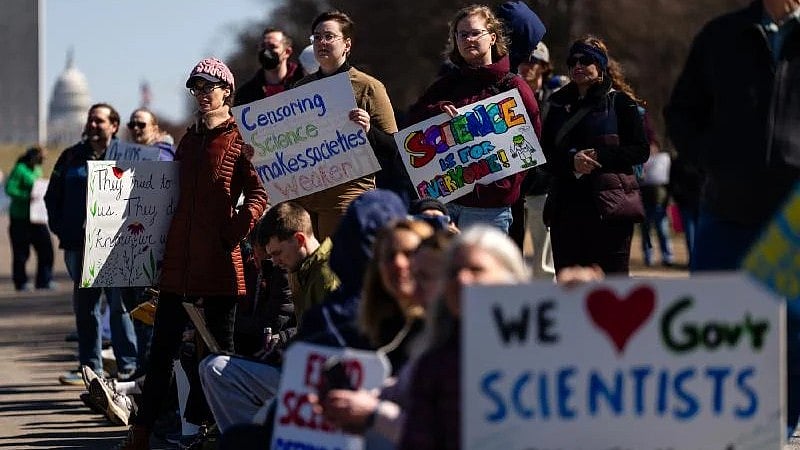
Protestors in Washington holding placards voicing concerns regarding censoring science.
Credit: NYT
The war on science began four centuries ago when the Roman Catholic Church outlawed books that reimagined the heavens. Subsequent regimes shot or jailed thousands of scientists. Today, in such places as China and Hungary, a less fearsome type of strongman relies on budget cuts, intimidation and high-tech surveillance to cow scientists into submission.
Then there is President Donald Trump, whom voters last year decisively returned to the White House. His blitz on science stands out because America’s labs and their discoveries powered the nation’s rise in the last century and now foster its global influence.
Just last week, Trump fired the newly confirmed director of the Centers for Disease Control and Prevention. Her lawyers said the move spoke to “the silencing of experts and the dangerous politicization of science.”
In rapid bursts, Trump has also laid off large teams of scientists, pulled the plug on thousands of research projects and proposed deep spending cuts for new studies. If his proposed $44 billion cut to next year’s budget is enacted, it will prompt the largest drop in federal support for science since World War II, when scientists and Washington began their partnership.
Few if any analysts see Trump as a Josef Stalin, who crushed science, or even as a direct analog to this era’s strongman leaders. But his assault on researchers and their institutions is so deep that historians and other experts see similarities to the playbook employed by autocratic regimes to curb science.
For instance, despots over the ages devised a lopsided way of funding science that punished blue-sky thinkers and promoted gadget makers. Trump’s science policies, experts say, follow that approach. He hails Silicon Valley’s wizards of tech but undermines the basic research that thrives on free thought and sows the seeds of not only Nobel Prizes but trillion-dollar industries.
“Despots want science that has practical results,” said Paul R. Josephson, an emeritus professor of history at Colby College and author of a book on totalitarian science. “They’re afraid that basic knowledge will expose their false claims.”
The president’s backers deny any suggestion that he engages in autocratic moves or has autocratic ambitions.
Trump “is a threat to bureaucracy, not democracy,” said Paul Dans, the architect of Project 2025, the right-wing blueprint for Trump’s presidency. “He has an extremely high regard for science.”
The ultimate target, according to the president and his supporters, is not science but rather the role experts play in generating the red tape that hobbles the nation’s economy and, they say, the research enterprise itself. They note that Project 2025 called for the dismantling of the administrative state.
Trump himself insists that, overall, he wants to save science. His defenders argue that he is cutting bloated budgets to restore public trust in science and spark a golden age of discovery.
Defenders of the postwar order concede that federal science management can be improved. But the Trumpian cure is, they add, far worse than any disease. They dismiss his recent moves and pronouncements as little more than pretexts for what they see as repressive tactics inspired by contemporary autocrats.
“Trump did not invent this playbook,” said Thomas M. Countryman, a career diplomat for 36 years who served as assistant secretary of state for international security in the Obama administration. “It depends on the squelching of all independent centers of thought, and that includes universities, law firms and scientists.”
Analysts say authoritarians and their students fear science in part because its feats — unlocking the universe, ending plagues, saving millions of lives — can form bonds of public trust that rival or exceed their own.
“Science is a source of social power,” said Daniel Treisman, a political scientist at UCLA. “It always poses a potential threat.”
Threatened or not, Trump has long scorned experts as overrated and has stated that he prefers to rely on common sense and gut instincts. “The experts are terrible,” he told the crowd at a 2016 rally in La Crosse, Wisconsin. “Look at the mess we’re in with all these experts that we have.”
If analysts differ on the reasons for Trump’s attacks on science, they agree that his actions could affect America’s long-standing role as the world leader in scientific discovery — either strengthening it or, conceivably, ending it. Will the nation continue to set the global standard for science breakthroughs?
The lead times for science projects can run to years and decades, so the practical impacts of Trump’s actions will most likely become clear only after he leaves office. For the United States, a time of new uncertainty is expected.